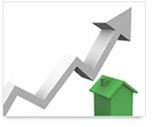The strength of increases in the average asking price in Central Otago, Gisborne and, inevitably, Auckland resulted in a 0.9% rise in the national average asking price to a new high of $537,682 in June.
In Auckland, the average asking price hit the over $800,000 mark for the first time.
June’s average asking price of $820,016 was 3.4% higher than the previous Auckland record of $793,260 which was recorded in May.
While Central Otago’s average asking price jumped by 9% to reach $762,284 in June, it was Gisborne’s average asking price that experienced the highest relative growth.
It went up by 10.3% - albeit from a lower base – to hit $287,140 in June.
Other regions that saw monthly increases in average asking price in June included Manawatu/Wanganui (+4.8%), Taranaki (+4.5%), Otago (+2.1%), Canterbury (+1.8%) and Central North Island (+1.7%).
Meanwhile, major population centres like Wellington and the Waikato saw a small decrease in the average asking price.
In Wellington, the average asking price went down by 1% to $457,488, and in the Waikato they dropped by 0.5% to $385,325.
However, the Realestate.co.nz date also showed that property demand continues to outstrip supply.
While 2.6% more new properties were listed in June 2015 than June 2014, the national average in overall inventory of available housing stock for sale is at an all-time low of only 20 weeks.
Inventory is a measure of supply and demand that indicates how long it would, theoretically, take for all the current properties on the market to be sold at the current average rate of sales.
Based on these figures, only two of the 19 regions in the country are currently rated as buyers’ markets.
They are Southland and the West Coast.




 Search
Search
